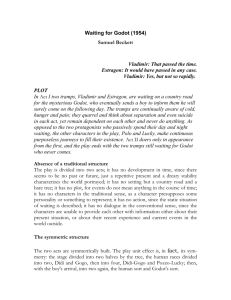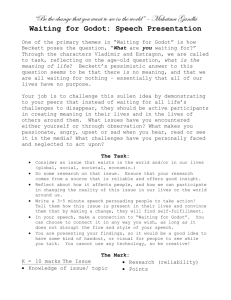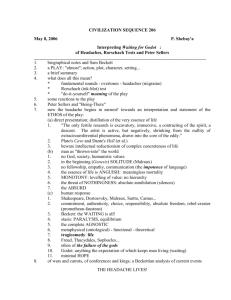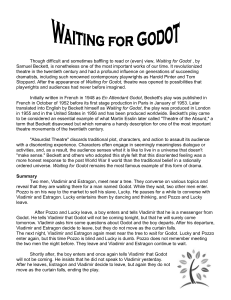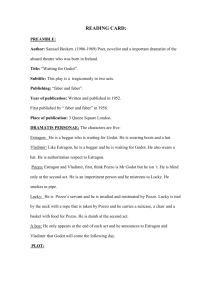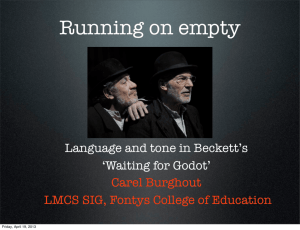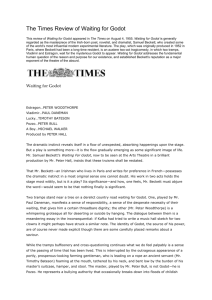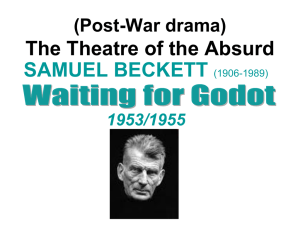EUROPEAN ACADEMIC RESEARCH, VOL
advertisement
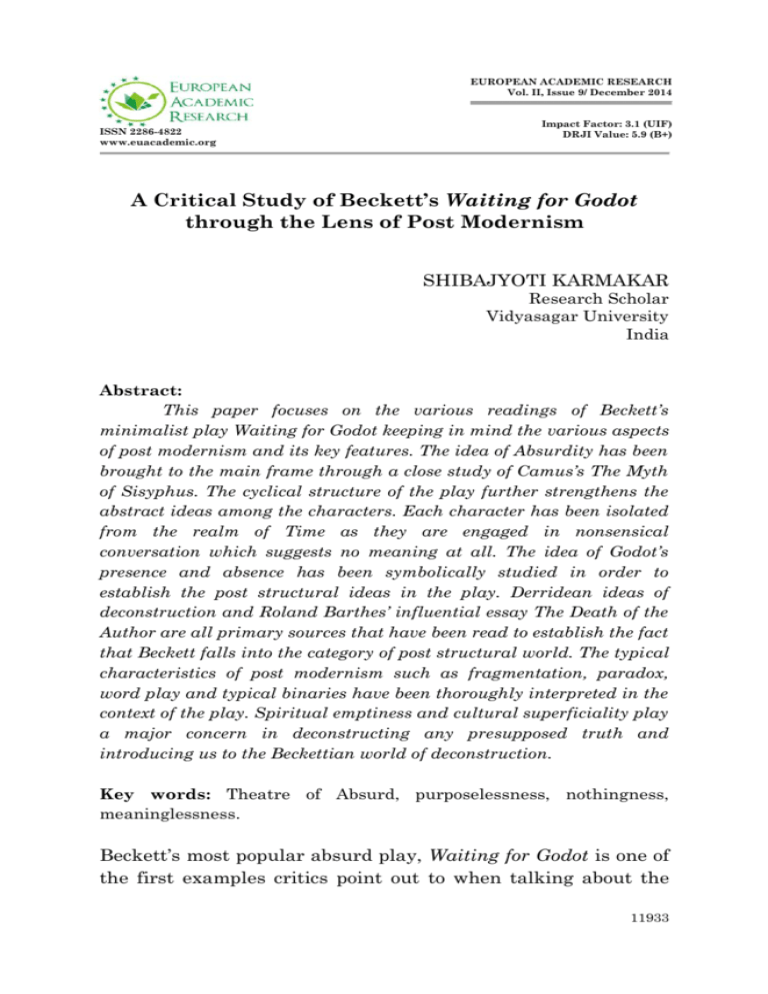
EUROPEAN ACADEMIC RESEARCH Vol. II, Issue 9/ December 2014 ISSN 2286-4822 www.euacademic.org Impact Factor: 3.1 (UIF) DRJI Value: 5.9 (B+) A Critical Study of Beckett’s Waiting for Godot through the Lens of Post Modernism SHIBAJYOTI KARMAKAR Research Scholar Vidyasagar University India Abstract: This paper focuses on the various readings of Beckett’s minimalist play Waiting for Godot keeping in mind the various aspects of post modernism and its key features. The idea of Absurdity has been brought to the main frame through a close study of Camus’s The Myth of Sisyphus. The cyclical structure of the play further strengthens the abstract ideas among the characters. Each character has been isolated from the realm of Time as they are engaged in nonsensical conversation which suggests no meaning at all. The idea of Godot’s presence and absence has been symbolically studied in order to establish the post structural ideas in the play. Derridean ideas of deconstruction and Roland Barthes’ influential essay The Death of the Author are all primary sources that have been read to establish the fact that Beckett falls into the category of post structural world. The typical characteristics of post modernism such as fragmentation, paradox, word play and typical binaries have been thoroughly interpreted in the context of the play. Spiritual emptiness and cultural superficiality play a major concern in deconstructing any presupposed truth and introducing us to the Beckettian world of deconstruction. Key words: Theatre of Absurd, purposelessness, nothingness, meaninglessness. Beckett’s most popular absurd play, Waiting for Godot is one of the first examples critics point out to when talking about the 11933 Shibajyoti Karmakar- A Critical Study of Beckett’s Waiting for Godot through the Lens of Post Modernism ‘Theatre of Absurd’. Written and first performed in French in 1954, the play had an enormous impact on theatre goers due to its strange and new conventions. “We are waiting for Godot” – with this utterance Beckett introduces us with a mysterious world that invites many critical discourses. The play begins with waiting and ends with waiting; waiting therefore has the most profound impact on everyone. Martin Esslin, one of the eminent critics of the post World War era has used the phrase ‘Theatre of Absurd’ to describe the plays of 1950’s and 1960’s. Plays written by Samuel Beckett, Eugene Ionesco, and Harold Pinter share the view that after the Second World War man inhabits a universe whose meaning is indecipherable, and that his existence in it is without purpose. He is bewildered, troubled and obscurely threatened. By absurdity we mean the existence without any meaning and purpose that we experience in our everyday life. The idea of absurdity has been derived from an essay by the French philosopher, Albert Camus who defined the human situation as basically meaningless and stagnant. In Camus’ The Myth of Sisyphus we find Sisyphus the man who scorns the Gods then he challenges their power, and causes a lot of troubles in life. As his punishment, ‘his whole being is exerted toward accomplishing nothing.’ He pushes his entire body to move a boulder up a mountain slope and when he reaches the top, it rolls back to the very bottom. Sisyphus must repeat this task for eternity. This is a painful experience for him. But Camus believes that Sisyphus is happy. He may have hundred times returned to his rock, yet he realizes that his fate ties him to this endless and futile labour. He is the owner of that fate. Once we are conscious of such useless and absurd things we do daily, we can accept them as our duty. Sisyphus similarly walks down the slopes, ready to try again, and ready to fail, because it his purpose. EUROPEAN ACADEMIC RESEARCH - Vol. II, Issue 9 / December 2014 11934 Shibajyoti Karmakar- A Critical Study of Beckett’s Waiting for Godot through the Lens of Post Modernism Structurally, Godot is a cyclical two act play. It begins with Vladimir and Estragon, who on the road side waiting for Godot. Act two is simply a repetition of Act one. As they wait, they play repetitive games, asked unanswered questions, speak much but seldom answer. In fact Vladimir and Estragon’s situation is our own. Through the characters’ repeating actions and words, Beckett has shown us the absurd existence of our lives. While waiting for something that does not exist, we run around circles, make the same mistakes, and lose faith. Each day Godot fails to appear. Vladimir and Estragon’s world is one of chaos. The tree, which is the only setting, is barren on one day and full of leaves the next day. Everyday Vladimir and Estragon returns to the same place only to wait for Godot, who never appears. No one seems to remember what happened the day before. Neither Vladimir nor Estragon seems to be sure of what happened in the past. They only make assumptions of their existing values. Sometimes they contemplate suicide as a form of escape. Beckett’s Endgame carries similar thinking. Hamm and Clov, the two figures are even more isolated than Vladimir and Estragon. Confined to a small room, the blind Hamm meditates on the subject of life and death. His servant Clov tries to provide him with a meaning which leads eventually to nothingness. The repetition in both of the plays provides evidence of unimportance of time in the lives of character. Life is a lengthy period of waiting, during which the passage of time has little importance. The amount of time the characters spent on waiting and the amount of time they would do so in future is unknown. But this type of existence was essentially meaningless for them. The play emphasizes the common nature of waiting for all people and therefore it suggests that the meaningless of time is universal. If one is always waiting for something to happen, the periods between that wait end up being meaningless, and if the event finally does happen, the process repeats itself. If that something never occurs with time, the waiting becomes meaningless with time. In any case one is EUROPEAN ACADEMIC RESEARCH - Vol. II, Issue 9 / December 2014 11935 Shibajyoti Karmakar- A Critical Study of Beckett’s Waiting for Godot through the Lens of Post Modernism always caught in a period in which our existence has no purpose and waiting is the only goal. From this we have to lead a life without any purpose and meaning. This idea is well demonstrated in Waiting for Godot. Throughout the play, Vladimir and Estragon’s trivial actions are used to fight the emptiness they are feeling in their lives. Beckett purposely uses a tree as a symbol of the fluxity of time. An example of their trivial actions is the switching of hats between Vladimir and Estragon. Another example is Vladimir feeding carrots, radishes, and turnips to Estragon. Vladimir ends one of these trivial feedings saying, ‘This is become really insignificant’. Time is indeed a significant factor to the interpretation of Waiting for Godot, but serves no meaning within the lives of the characters in the play. The insignificance of our life in waiting for Godot corresponds to the importance of the routine of waiting to pass the time in the play. Time is essentially a kinetic one, not static; it is an act of illusion in the play. At once Vladimir says that ‘Time has stopped.’ Vladimir and Estragon end the play, just as they began it: waiting for Godot. In Act one Pozzo is seemingly healthy, and he is certain that he can see. He is travelling to market to sell Lucky, who ‘used to be so kind ... so helpful....so entertaining’ but he is now unbearable to his master. In Act two the situation has undergone change. Pozzo is blind and Lucky is mute. Pozzo has no recollection of the meeting the day before. When Vladimir asks about his blindness, Pozzo responds “I woke up one fine day as blind as Fortune”. Vladimir, who is sceptical, asks him for more details. Pozzo then quickly responds to it, “Don’t question me! The blind has no notion of Time.” When Pozzo asks Estragon about Vladimir’s age, he answers, ‘eleven’, once again they establish the fact that we have no purpose in our life apart from our birth and death. Boredom, which is another form of inaction greatly, weakens one’s belief in capturing the essence of life. Estragon opens the play by saying, “nothing to be done”. Vladimir immediately follows him, “I am beginning to EUROPEAN ACADEMIC RESEARCH - Vol. II, Issue 9 / December 2014 11936 Shibajyoti Karmakar- A Critical Study of Beckett’s Waiting for Godot through the Lens of Post Modernism come round that opinion”. This sort of boredom creates much doubt in Vladimir and Estragon. But the twist is that no one in the play freely willing to claim that he is bored with the situation and thus he is inactive. Instead they prefer to go on living their lives by saying things like, “we always find something to give us the impression that we exist”. In this respect the play has been read within the fundamental existential take on life. The fact that none of the characters retain a clear mental history means that they are constantly struggling to prove their existence. The idea of companionship has the greatest sense of meaning within the given context of absurdity. Neither Vladimir nor Estragon could bear living alone. Each has a need for a friend hence each character progresses on various actions which is interdependent on one another. In Jean Paul Sartre’s book, Existentialism and Human Emotions, he opines: I cannot be anything unless others recognize me as such. In order to get any truth about myself, I must have contact with another person. The other is indispensable to my own existence, as well as to my knowledge about myself. (10) Vladimir recognizes Estragon as a necessary companion and vice- versa so each is able to qualify himself as a meaningful person. The two characters derive much of their self value from their companionship. If Estragon seems to be weak, Vladimir always allows her hands to help. Vladimir helps Estragon out to get his boots on saying, “yes yes. Come on, we will try the left first.” Vladimir is also the one who seems to be responsible for feeding Estragon. When Estragon violently says, “I am hungry,” Vladimir cheerfully responds, “Do you want a carrot,” as if feeding Estragon is his most appealing duty. Vladimir and Estragon certainly share the strongest desire for companionship. This is apparent in the following dialogue. VLADIMIR : come to my arms! ESTRAGON: your arms? VLADIMIR: My breast! (85-86) EUROPEAN ACADEMIC RESEARCH - Vol. II, Issue 9 / December 2014 11937 Shibajyoti Karmakar- A Critical Study of Beckett’s Waiting for Godot through the Lens of Post Modernism Both Estragon and Vladimir insist on chatting meaningless matter in order to kill time. The above conversation hints at the homo erotic reading of the play. As the play progresses, Estragon says, “why don’t we hang ourselves?” Their lives have turned so monotonous that they are now wishing to hang themselves. It somehow correlates with Nietzsche’s idea that “suicide is the deed of nihilism”. Hence it would be appropriate to say that there is a link between the play and Nihilism which lies within the domain of post modernism. The play “Waiting for Godot” paves the way for the birth of post structural world, in which Beckett seems to be one of the torch bearers of Derridean world. Beckett’s central character in the play have created a logo called Godot, a logo which seems to be the ultimate source of erasing the misery of the characters who find themselves drowned in the oozy ocean of incapability. Godot is the sole power, which is expected to save and enrich them and change their dystopia into utopia. The sense of existence comes when there is the sense of self- esteem, the sense of having the ability to think one’s own thought independently. Beckett’s characters simply tie up to the logo centric term Godot and have taken it for granted that Godot is the dominant source of damnation and salvation. They believe that the colourful meaning of truth can only be attained under the shelter of the presupposed logos. The French philosopher Jacques Derrida is one who has claimed the relationship between language and reality in his texts, ‘Writing and difference’ and Of Grammatology, where he denies the stability of signification system in language. For him, there is no pre existent truth, ‘transcendental signifier’ or ‘logos’ to which one can appeal to find meaning. His deconstruction therefore affirms the importance of ambivalence, of the relation between terms rather than the choice of one term over another. In spite of being a poignant play about endless waiting, the title “Waiting” has obvious symbolic dimensions. The title demands interpretation of Roland Barthes’ ‘writerly text’ where EUROPEAN ACADEMIC RESEARCH - Vol. II, Issue 9 / December 2014 11938 Shibajyoti Karmakar- A Critical Study of Beckett’s Waiting for Godot through the Lens of Post Modernism the reader gets the greatest freedom of constructing meanings of their own. We do not know who or what Godot is. Although Godot is an offstage character, he is present from the very first moments of the play. He is perceived in every word and every move of the two friends. But Godot’s identity is obscure and this has been the subject of much debate. Vladimir and Estragon remain faithful to him and Godot remains their only hope. But the more they talk and think about Godot, the more he becomes obscure. The significance of the syllable God cannot be denied in this context. There is also a reference to a character called Godeau in a play by Balzac; Godot may be the unreachable God; he is death; he is some kind of future utopia; he is the panacea of food and shelter; he may be symbol of hope of the ordinary French citizen under German captivation; he may be the superlative creature who can save or punish the two protagonists; in Greek mythology, Zeus was the supreme leader of Greek deities and was known as Jupiter or Jove by the Romans. He seized the throne of the universe by revolting against his father, Cronus, in a war called Titanomachy. Zeus then established his court on apex of Mount Olympus, the highest mountain in Greece, which is placed on the borders of Thessaly and Macedonia. As the ruler of the Universe, Zeus did not tolerate any transgressions and punished his offenders relentlessly and with no discriminations. The major similarity hold between Zeus and Godot is that they assert the state of being the absolute power. It is one of the important factors of interpretation because both the Zeus and Godot are superlatives as they are literally seen inspite of their physical absence in the play. Beckett however does not help a lot in finding the ultimate response to the inquiry of whom or what Godot is. He once in an interview said, “If I knew, I would have said in the play”. The author offers no clarity of attribution. It is therefore hints at plurality and multiplicity of texts. The author has been seen as a subject to several influences when writing. Barthes says we can never know the true influence of EUROPEAN ACADEMIC RESEARCH - Vol. II, Issue 9 / December 2014 11939 Shibajyoti Karmakar- A Critical Study of Beckett’s Waiting for Godot through the Lens of Post Modernism writing because writing destructs every point of origin. In short, Beckett attacks the classic tradition of modernism, presenting his argument that there is nothing as the “Author” of a text, but a scripter whose ideas are not entirely original. Barthes argues in “The Death of the Author” that once the author is removed from the text, it is within the reader of the text on which various meanings of the text depend. The text therefore invites many interpretations of the reader. Beckett’s “Waiting for Godot” is an attack on modernist idea of grand narratives. The play claims to interpret a world of Vladimir and Estragon who are trapped by the modernist nostalgia for the legitimating idea of Godot. The play is a renaissance towards breaking the fossilized structure of the prescribed norms and notion. Post modernism encourages the study of meta- narrative, which became popular aftermath of two World Wars. Post Modernism relies heavily on fragmentation, paradox and questionable narrators. It refers to the state of being that lacks a central hierarchy. In Post modern world nothing is shaped within pre supposed universal truth. Man lives today denying the objectives of a perfectly ordered state. The world is a place where things happen randomly. We live or we die by chance. The various conditions we endure, we endure by chance. There is no well crafted plan, no scheme of justice in world by which the universe operates. The enigmatic road, the cryptic tree, and more importantly all of the characters and their shades and moves in the play, are not primarily establish any pre-supposed truth or any sense of order or reason. Hence they exist in an ambiguous and absurd world where every meaning is disseminated rather than conveyed. It disperses throughout the realm of what Derrida calls “Difference”, the realm of “Free Play”. And finally, one way of understanding this play is to see it as an absurd play about waiting, about waiting for the responsibility to perform, about waiting for better future that we are not fully convinced whether it will arrive or not. EUROPEAN ACADEMIC RESEARCH - Vol. II, Issue 9 / December 2014 11940 Shibajyoti Karmakar- A Critical Study of Beckett’s Waiting for Godot through the Lens of Post Modernism Lastly, we can say that our post modern world seems a place of spiritual emptiness and cultural superficiality, in which social practices are endlessly repeated and parodied. It is a world of fragmentation and alienation where individual has no sense of self and history. Time passes and the repetition comes and comes at the same point of circle from where the journey started. WORKS CITED: Begam, Richard, (1996), Samuel Beckett and the End of Modernity, Stanford University Press, Stanford Brater, Enoch & Ruby Cohn, (1990), Around the Absurd: Essays on Modern and Postmodern Drama, The University of Michigan Press, Michigan Camus, Albert. The Myth of Sisyphus. London: Penguin Books, 2000 Cronin, Anthony, (1997), Samuel Beckett: The Last Modernist, Harper Collins, Londra Durbach, Errol. ‘The formal pattern of Waiting for Godot’. English Studies in Africa 13 1970 379–89 Esslin, Martin. The Theatre of Absurd. Revised ed. New York: Doubleday/Achor,1969. Hinchliffe, Arnold P. The absurd. London: Methuen, 1969, 63– 72 (on the play and Endgame) Pinter, Harold. ‘Letter [August 1955] from Harold Pinter to his friend, Mick Goldstein, regarding Waiting for Godot’. Pinter Review: Collected Essays 2003 and 2004 2004 5–6 EUROPEAN ACADEMIC RESEARCH - Vol. II, Issue 9 / December 2014 11941
